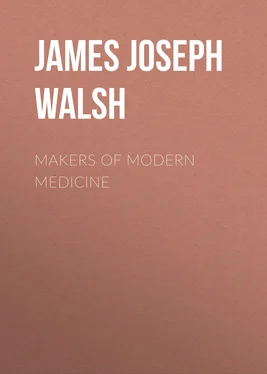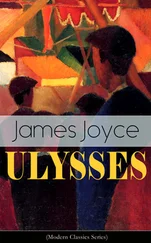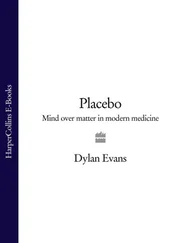James Walsh - Makers of Modern Medicine
Здесь есть возможность читать онлайн «James Walsh - Makers of Modern Medicine» — ознакомительный отрывок электронной книги совершенно бесплатно, а после прочтения отрывка купить полную версию. В некоторых случаях можно слушать аудио, скачать через торрент в формате fb2 и присутствует краткое содержание. Жанр: foreign_prose, Медицина, foreign_antique, на английском языке. Описание произведения, (предисловие) а так же отзывы посетителей доступны на портале библиотеки ЛибКат.
- Название:Makers of Modern Medicine
- Автор:
- Жанр:
- Год:неизвестен
- ISBN:нет данных
- Рейтинг книги:3 / 5. Голосов: 1
-
Избранное:Добавить в избранное
- Отзывы:
-
Ваша оценка:
- 60
- 1
- 2
- 3
- 4
- 5
Makers of Modern Medicine: краткое содержание, описание и аннотация
Предлагаем к чтению аннотацию, описание, краткое содержание или предисловие (зависит от того, что написал сам автор книги «Makers of Modern Medicine»). Если вы не нашли необходимую информацию о книге — напишите в комментариях, мы постараемся отыскать её.
Makers of Modern Medicine — читать онлайн ознакомительный отрывок
Ниже представлен текст книги, разбитый по страницам. Система сохранения места последней прочитанной страницы, позволяет с удобством читать онлайн бесплатно книгу «Makers of Modern Medicine», без необходимости каждый раз заново искать на чём Вы остановились. Поставьте закладку, и сможете в любой момент перейти на страницу, на которой закончили чтение.
Интервал:
Закладка:
It was not long before the genial insight of Valsalva picked out Morgagni as a person excellently fitted to assist him in his dissecting work. Morgagni had not only an enthusiasm for the work, but had, what is much more precious under the circumstances, untiring patience and industry and unswerving perseverance. These were the qualities that were afterward to prove the foundation of his reputation. His genius consisted certainly in the faculty for hard work, and his special talent was an infinite capacity for taking pains. Nearly all of the dissections which Valsalva required for his demonstrations during lecture hours, or for the illustrations of his books, are said to have been made by Morgagni under the master's personal supervision.
After four years of this precious training and study at the university, Morgagni took his degree as Doctor of Medicine and of Philosophy. The late Benjamin Ward Richardson, one of the great English medical men of the end of the nineteenth century, says that this is a happy combination of qualifications which might, with great advantage, be required of the graduate in the present day, when so much of medicine and so little of philosophy is demanded of the student, to the manifest detriment of both departments of knowledge.
Some idea of the estimation in which Morgagni was held at this time may be gathered from the fact that, though scarcely more than twenty-one years of age, he was sometimes allowed to assume Valsalva's lecture obligations during the master's absence. After graduation he spent some time at the university doing special work in connection with the science of anatomy, in which he was so much interested, and as an assistant professor and tutor. Bologna at this time enjoyed as wide a European reputation as at any period of its history. Students from all countries in Europe flocked here, especially to make their legal and medical studies. Among the medical students Morgagni was always a moving spirit, a leader in the phases of thought in many lines that were occupying students' minds at the time.
He was the founder and director of a society of young professors and maturer students, whose object was the discussion of scientific subjects of many kinds. The standard of the new society was personal investigation and observation as a means of arriving at scientific truth. The principal maxim that guided their discussions seems to have been that nothing was to be accepted on authority, merely because it was authority. In the physical sciences thought had been frequently cramped to fit the old theories inherited from Galen and Pliny and Aristotle and Hippocrates. A quotation from one of these classic authors on a point at issue was supposed to throw light on any difficulty that might be the subject of discussion.
Morgagni's society was called the Academia Inquietorum–"The Academy of the Restless"–the idea of the curious name being that the members were not satisfied to rest peacefully in the knowledge to be gleaned from the older authors, but preferred to get at science for themselves by direct observation and planned experiment. Morgagni's idea in founding the society seems to have been premature. The fate of the Academy of the Restless is involved in some obscurity, but biographers seem to hint that it failed of its purpose. Neither the university nor the times were yet ready for such freedom of thought as this. Even in our own day such a scheme would be considered radical and chimerical. The discouragement met with finally led to the abandonment of the meetings, and Morgagni gave up his attempt to inspire others with his own industry and enthusiasm for original investigation in the physical sciences.
For some years after this he seems to have been absent from Bologna. His time was spent especially at the medical schools of the great universities of Pisa and of Padua. Students who wished to make some special branch of medicine such as physiology, or anatomy, or the, then as yet scarcely known, science of pathology, their prime object in life, had to visit various universities in order to find opportunity and suggestion for study. Morgagni devoted himself so faithfully to his work that his eyesight failed him for a time and very probably his general health also. For some years he returned to his native town to recuperate. Here he took up the active practice of medicine. As so often happens, this period of rest after years of study proved especially broadening in its influence upon Morgagni. After his rest his contemporaries begin to realize his great possibilities as a scientist.
His first publication was a series of notes on anatomy. These were published in the form of collected essays, with the title Adversaria Anatomica . The title has a pugnacious sound, but Morgagni did not indulge in controversy and adversaria is only the Latin name for note-books. The first articles thus collected were really communications made by Morgagni to the "Academy of the Restless" during his presidency of that body. This opened his career as a writer, and it is interesting to note that his last book was to be published some sixty-three years later–a period of fecund authorship almost unprecedented.
As the result of the reputation gained by this work he was offered a teaching position at the University of Padua and later was transferred to the chair of the second professorship of anatomy. After a few years he succeeded to the first professorship of anatomy at the university, at that time the most important post in the medical school. This gave him, at the age of about thirty-five, one of the greatest university professorships in the world. Opportunities for research were now amply provided. He was in a position where his communications would be received with due attention and his reputation was secure.
A university professorship in those days was a position of more importance than even in our own, and Morgagni was especially favored in the fact that it had come early in life, so as to enable him to round out his career. His work was eminently congenial to him, and the labor it involved was that which constituted for Morgagni the highest form of recreation. He made many friends among professors and students. The lectures which Morgagni delivered to the university became so popular that his lecture-room was overcrowded and new quarters had to be provided. Many foreign students were attracted to the university by his wide-spread reputation as a great and suggestive teacher. These students came in great numbers especially from the northern countries of Europe. At one time there were over a thousand German students at the University of Padua, and when they organized into a guild for mutual help and social purposes, Morgagni was chosen by them to act as their patron.
Here at the University of Padua Morgagni was to found the new science of pathological anatomy. Normal anatomy had received its development at the hands of the other great masters in the schools of North Italy. To Morgagni was to be given to describe the changes which take place in organs as the result of disease. Needless to say, this is the most important practical branch of modern medical science. The symptoms of disease mean very little unless we know just what organs are affected and what changes have taken place. Morgagni's work on The Seats and Causes of Disease contains the foundation of modern pathology. Modern advances might seem to put it out of date, but the acuity of its author's observations and the truth of his investigations make it an enduring classic.
Of this work of Morgagni's, Professor Benjamin Ward Richardson, said: "To this day no medical scholar can help being delighted and instructed by the study of this wonderful book. To move into it from the midst of a body of current medical literature, is like passing from the periodical flux of current general literature to the perusal of a Shakespearean drama, the Pilgrim's Progress , or Paradise Lost . It is a transition from the mediocrity of incessant repetition of well-known truths told in long and hackneyed terms, back to descriptions derived direct from nature and fresh from her treasury. It matters not where the book is opened, it is always good and instructive reading, full of suggestion and rich in original narrative."
Читать дальшеИнтервал:
Закладка:
Похожие книги на «Makers of Modern Medicine»
Представляем Вашему вниманию похожие книги на «Makers of Modern Medicine» списком для выбора. Мы отобрали схожую по названию и смыслу литературу в надежде предоставить читателям больше вариантов отыскать новые, интересные, ещё непрочитанные произведения.
Обсуждение, отзывы о книге «Makers of Modern Medicine» и просто собственные мнения читателей. Оставьте ваши комментарии, напишите, что Вы думаете о произведении, его смысле или главных героях. Укажите что конкретно понравилось, а что нет, и почему Вы так считаете.












